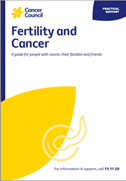- Home
- Ovarian cancer
- Managing side effects
- Menopause
Menopause
If you were still having periods (menstruating) before surgery, having your ovaries removed will mean you no longer produce the hormones oestrogen and progesterone, and your periods will stop. This is called menopause.
When menopause occurs naturally, it is a gradual process that usually starts between the ages of 45 and 55, but menopause after surgery is sudden.
Symptoms of menopause can include:
- hot flushes
- dry or itchy skin
- mood swings
- trouble sleeping (insomnia)
- tiredness
- vaginal dryness.
These symptoms are usually more intense after surgery than during a natural menopause, because the body hasn’t had time to get used to the gradual decrease in hormone levels.
Managing the symptoms of menopause
 | Check your cholesterol levelsCholesterol levels can change after menopause, which can lead to heart disease. You can manage cholesterol levels with regular exercise and a balanced diet. Ask your doctor about cholesterol-lowering drugs. |
Use a vaginal moisturiserThis will help with vaginal discomfort and dryness. You can buy a vaginal moisturiser over the counter from chemists. | |
Learn meditation and relaxation techniquesThese may help reduce stress and lessen symptoms. | |
Ask about menopause hormone therapy (MHT)Previously called hormone replacement therapy (HRT), there are benefits and risks to managing menopause with MHT. Ask your doctor if MHT is safe for you to use after treatment for ovarian cancer. | |
Have your bone density checkedMenopause can increase your risk of developing thinning of the bones(osteoporosis). Talk to your doctor about having a bone density test or taking medicines to prevent your bones becoming weak. Regular exercise will help keep your bones strong. For more information, see Healthy Bones Australia. |
→ READ MORE: The impact of ovarian cancer on sexuality and intimacy
Podcast: Meditation and Relaxation
Listen to more of our meditation and relaxation podcasts
More resources
Dr Nisha Jagasia, Gynaecological Oncologist, Mater Hospital Brisbane, QLD; Sue Hayes, Consumer; Bronwyn Jennings, Gynaecology Oncology Clinical Nurse Consultant, Mater Health, QLD; Dr Andrew Lee, Radiation Oncologist, Canberra Region Cancer Centre and Canberra Hospital, ACT; A/Prof Tarek Meniawy, Medical Oncologist, Sir Charles Gairdner Hospital, WA; Caitriona Nienaber, Cancer Council WA; Jane Power, Consumer; A/Prof Sam Saidi, Senior Staff Specialist, Gynaecological Oncology, Chris O’Brien Lifehouse, NSW.
View the Cancer Council NSW editorial policy.
View all publications or call 13 11 20 for free printed copies.
Need to talk?
Support services
Life after cancer treatment
Webinars, exercise and nutrition, sexuality programs, and back-to-work support
Coping with cancer?
Talk with a health professional or someone who has been there, or find a support group or forum
Cancer Information
Fertility and cancer
Learn more about how cancer can affect fertility, and ways to manage this
Sexuality, intimacy and cancer
Learn how cancer and its treatment may affect your sexuality, sex life and relationships, and how to cope with this

